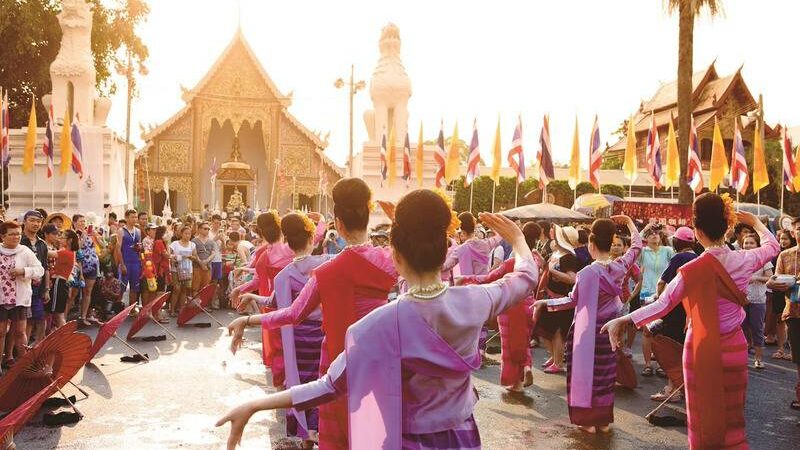Songkran begins in Thailand on April 13, sparking raucous water fights on the streets of Bangkok and beyond.
This three-day festival marks the start of the traditional Thai New Year and is a major attraction for tourists.
Here’s everything you need to know about Songkran, including its origins and where it’s celebrated.
Why is Thai New Year celebrated in April?
Songkran, Thai New Year, is Thailand’s largest and most important annual festival.
It is traditionally celebrated for three days after the first full moon in April. This is because the country follows the Lunar-Solar Buddhist Theravada calendar.
The name Songkran refers to the movement of the zodiac and is derived from the ancient Sanskrit word meaning “to enter” or “pass into.”
The festival start date is currently set for April 13th.
Why do water fights occur during Songkran?
The water fights that have become synonymous with Songkran are an escalation of the tradition.
The first day of the festival is traditionally celebrated with spring cleaning and water pouring ceremonies. Scented water is poured over the sacred Buddha statue in the temple. This symbolically represents purification, washing away the past year and welcoming the new year.
On the second day, in exchange for blessings and garlands, young people pour scented water on their hands and feet, pay homage to their elders, and offerings are made to monks and temples.
This festival marks the beginning of the rainy season and also one of the hottest times of the year.
Outside the temple, these elements turned into a massive water fight with super soakers, buckets of ice water, loud music, and street parties.
Additionally, revellers “bless” one another by applying “din sor pong,” a cooling talcum powder paste made from limestone, to one another’s looks. This is still a common aspect of the event and is normally used responsibly, although it has been banned in recent years because some people smear it in other people’s eyes and mouths, or even use it as an excuse for unwanted touching.
Where’s the best place to celebrate Songkran?
If you’re prepared to get soaked for three days, Bangkok is the perfect place for Songkran. At Khao San Road, the capital of the backpacker world, you’re sure to find lively parties and crowded water fights. Siam in central Bangkok is also gearing up for Songkran, with a variety of pop-up stages showcasing traditional dance and live music.
Silom Road is another hub for his LGBTQ-friendly parties along Soi 4, and the W Bangkok Hotel hosts a large pool party each year. New revelers head to RCA, the epicenter of the city’s club scene. This year the Siam He Songkran Music Festival will be held here.
If you want to take things to the next level with water cannons, laser beams and world-class DJs, book your tickets to S2O Music Festival.
For a more traditional side of the festival, visit riverside temples such as Wat Pho and Wat Arun, attend cultural performances at Lumphini Park, or head north to Chiang Mai City.
Want some sun, sea and sand, even while getting soaked? The infamous beach town of Pattaya is extending its Songkran celebrations for a full week. Other popular beaches such as Phuket, Krabi and Koh Phangan will also join in the celebrations.
Tips for celebrating Songkran
If you’re in Thailand during Songkran, be prepared to get wet.
Street vendors are selling waterproof bags perfect for keeping your phone safe and dry for events. Safety glasses are also available, and when you get the spray in your eye, you’ll understand why.
Avoid putting water in your mouth as it may make you feel sick. But don’t forget to stay hydrated with a bottle of filtered water.
Please join us in the celebration. However, please be respectful and do not splash water on monks, the elderly, or babies. Please play in the water in the designated area.
Songkran is known as a dangerous time on Thailand’s roads due to drunk driving and splashing. It is best to avoid traveling during the festival period. Please use public transportation within the city.
- Lauren Sanchez: Everything to Know About Jeff Bezos’ Fiancee - December 23, 2024
- Lose Weight Faster: Top 5 Cardio Workouts to Try Today - December 23, 2024
- World Meditation Day 2024: The Emotional Growth Benefits of Mindfulness for Kids - December 21, 2024





